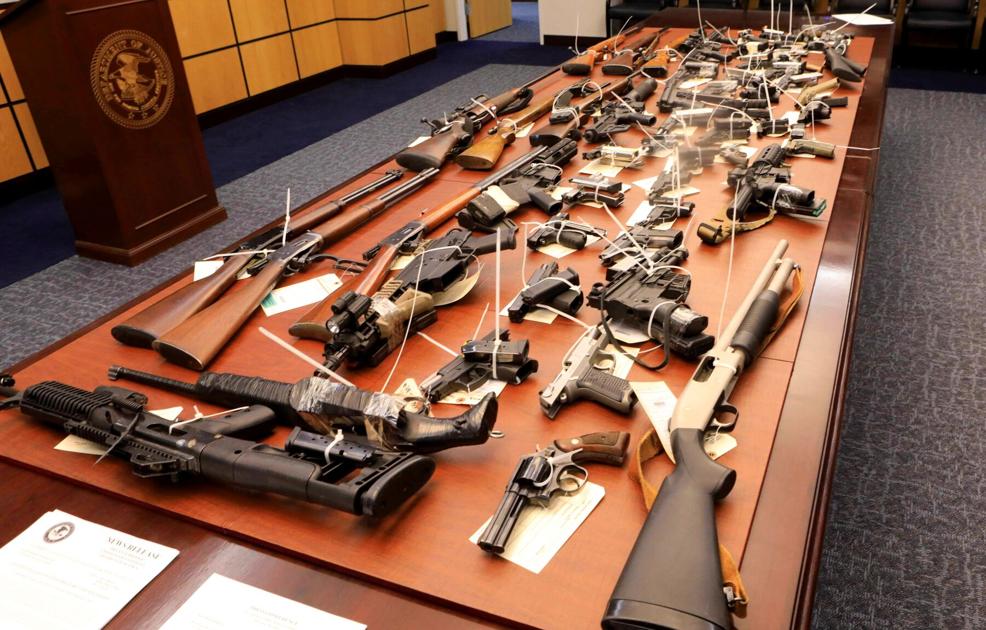South Carolina wisely strips people of the right to vote when they’re convicted of a felony.
We’re not nearly so wise when it comes to another constitutional right: the right to possess guns. This despite the fact that there’s a connection between a history of committing serious crimes and the propensity to kill or injure other people.
While the list of felonies in S.C. law goes on for 7,821 words, the list of crimes for which you lose your right to own a gun is only 502 words. That shorter list contains what the Legislature has defined as “violent crimes” — even though a number of violent crimes aren’t on the list, and the list includes some crimes that are indeed bad but that frequently are committed without any violence.
We don’t mean to suggest that South Carolina is too quick to take away criminals’ voting rights. It’s not. But as SLED Chief Mark Keel argues, we’re way too slow to take away their gun rights.
The Post and Courier’s Seanna Adcox reports that Chief Keel is searching for ways to fight an alarming increase in homicides in our state: up 51% in the past five years, and up 25% — from 457 to 571 — last year alone.
That’s still fewer killings than we routinely had just a couple of decades ago, but it’s more than 500 people killed in South Carolina last year. SLED is joined by prosecutors and sheriffs and police chiefs — including Charleston Chief Luther Reynolds, who has been quite vocal about it — in calling for a commonsense law to expand the list of criminal convictions for which people would lose their gun rights, and increase the criminal penalties for using a gun in violation of the prohibition.
Now it’s true that felons have their voting rights restored after they complete their entire sentence, including serving probation that’s often longer than the prison sentence and paying fees and fines, whereas the state’s very limited ban on violent criminals possessing guns is open-ended.
But it still reflects a legislative mindset that puts a higher priority on owning guns than on voting — and it’s hard not to see a connection between that mindset and some of the lowest voter participation numbers and highest gun death numbers in the nation. Whatever you think of the former, surely we’re all concerned about the latter.
Fortunately, it’s easy to come up with a way to do a better job of keeping guns out of the hands of criminals, and in so doing reduce the number of innocent people who are injured and killed by criminals. And please note: We’re not talking about keeping guns away from innocent people. We’re talking about keeping them away from criminals — people who have been convicted of crimes.
The most obvious is to increase the criminal sentence for illegal possession of a gun. The penalty under current law is a fine of up to $2,000 and up to five years in prison. That’s the punishment for first conviction or third conviction or tenth conviction. The penalty seems a bit low for first offense and tremendously low for subsequent convictions.
H.3708 by Democratic Rep. Seth Rose and H.3418 by GOP Rep. Bruce Bryant, a former sheriff, would increase penalties for the first and subsequent convictions — Mr. Rose to as much as three years for first offense and 15 for third, and Mr. Bryant as much as 10 years for first offense and a minimum of 15 years and up to 30 for third.
The trickier fix concerns who should be prohibited from owning a gun again. Both representatives propose applying the ban to anyone convicted of a crime that carries a sentence of a year or more. We don’t object to that approach; the problem is that the National Rifle Association objects, and so the bills haven’t even been considered. You remember the NRA? The organization that used to say lawmakers just need to focus on criminals with guns? The organization that used to work with the police rather than treating them as enemies?
An NRA spokesman told Ms. Adcox the bills would mean “thousands of South Carolinians with nonviolent misdemeanor convictions immediately losing their Second Amendment rights.” Sort of like the tens of thousands of South Carolinians with nonviolent misdemeanor convictions who already lose their voting rights, although not permanently.
If that’s a real concern — rather than cover for being against keeping guns out of the hands of criminals — it’s easier to address: Copy the federal law, which prohibits gun ownership for anyone convicted of a felony; after all, that’s what most people think the law is already. (We need a state law because while the FBI and other federal agents can enforce federal laws in South Carolina, in most cases S.C. police can’t.)
Simply mirroring federal law isn’t a perfect fix, because some crimes that South Carolina classifies as felonies are actually less serious than some we classify as misdemeanors, and vice versa. But lawmakers could easily carve out exceptions — felonies for which the ban doesn’t apply, and misdemeanors for which it does.
In general, though, our law should work the way former Sheriff Bryant envisions it: “If you commit a felony, you should not be allowed to have a firearm.”








